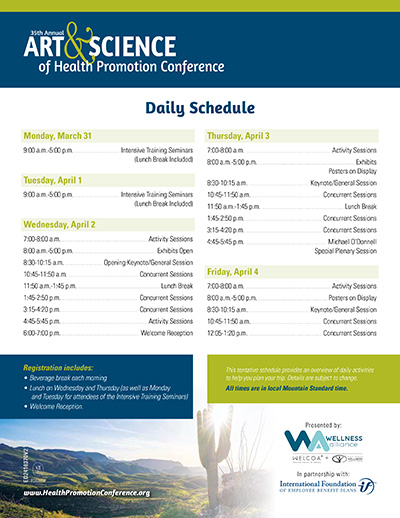
Conference Schedule
Why You Should Attend
- Join other health promotion and wellness professionals to learn, share and connect.
- Be inspired and equipped to bring new practices and approaches to your health promotion efforts.
- Find support in creating programs and resources that meet the needs of a diverse, multigenerational workforce.
- Learn strategies for raising awareness, building skills, and promoting policies and practices that foster population health and well-being, including more positive and supportive interactions.
Full Agenda
8:30 AM - 10:15 AM
Did you know that employees who have meaningful relationships at work are seven times more likely to be engaged in their jobs, take fewer sick days, collaborate more effectively, provide better customer service, and have higher loyalty to their companies? Belongingness is the number one factor for employee satisfaction, and creating a culture of belonging is an effective solution for decreasing turnover and increasing employee fulfillment.
In this dynamic and interactive program, social relationships expert and author of The Business of Friendship: Making the Most of Our Relationships Where We Spend Most of Our Time, Shasta Nelson provides a framework to evaluate belongingness within your teams and delivers practical tools to create and accelerate the high-trust and resilient relationships that boost employee productivity, retention, and profitability.
10:45 AM - 11:50 AM
As a conference attendee, have you ever wondered if you are hearing anything truly groundbreaking? Persistent and pervasive challenges with physical, emotional, social, and financial well-being raise questions about the success of our efforts in health promotion in the past two decades. Despite concerted efforts of multidisciplinary scientists and practitioners, rates of obesity, anxiety, depression, burnout, loneliness, lack of social connection, financial distress, and disconnection from nature remain concerningly high.
This session will summarize the findings of a literature review that examines progress in health promotion literature from 2003 to 2023. A team led by three health promotion scholars is comparing the articles published in six top-tier health promotion journals (American Journal of Health Promotion, Health Education and Behavior, Health Psychology, Annals of Behavioral Medicine, American Journal of Preventive Medicine, and Health Promotion Practice) in 2003 to those published in 2023. Only articles relating to health behaviors or interventions will be included (i.e., no commentaries). The team will report on the evolution of the literature or lack thereof over the past two decades. The review considers theoretical and conceptual models, health behaviors, study design, methods, target populations, extent to which research addresses unmet social needs, single vs. multiple behavior change focus, study limitations, and proposed future research directions. Join us to reflect on insights about where we’ve been and where we are going as a field – as well as how we can accelerate our progress in the next five years.
-
Amy Eyler, Ph.D.
-
 Sara Johnson, Ph.D.
Sara Johnson, Ph.D. -
 Jay Maddock, Ph.D.
Jay Maddock, Ph.D.
10:45 AM - 11:50 AM
An increasing number of reports over the years illustrates the statistical and qualitative trends tracking the experiences of the U.S. workforce within organizational climates that either encourage or inhibit a healthy mental well-being. Psychological safety is an important topic to address because of its association with positive work environments and job satisfaction. Dr. Amy Edmondson defines psychological safety as a shared belief that a group is safe for interpersonal risk-taking. In addition to the definition, participants in this session will be introduced to the stages of psychological safety as an indicator for progression through multi-layered dynamic changes within a team’s journey.
Leadership has been found to have the most significant impact on staff’s perception of psychological safety. The exercises in this session will also guide participants on how to examine the impact of leadership on the culture, investigate the workforce’s perceptions of psychological safety, and utilize the tools to facilitate a culture of workforce well-being.
Strategic disruption is what happens at the intersection of status quo that upholds a system operating under toxic stress and the adoption of a new belief system that cultivates trust and an environment in which all members of the workforce can thrive. Understanding how psychological safety feels and looks will be part of the experiential learning exercises in this session. Participants will engage in practical application activities focused on securing psychological safety for themselves and facilitating it for others using boundary spanning leadership tools to create safety and foster trust.
10:45 AM - 11:50 AM
Belonging is essential to individual well-being and organizational success, yet as a health promotion program or intervention, the skills, habits, and practices of belonging are often overlooked. To distill the actionable takeaways from this week’s conference, four featured experts will discuss how health promotion practitioners can bring belonging and connection to each individual and group they serve. This panel offers actionable strategies to create healthier, more inclusive environments. Attendees will be exposed to new ideas and innovative strategies, research-based insights, and a deeper understanding of the transformative power of belonging for individuals and in creating thriving, inclusive organizations.
12:05 PM - 1:20 PM
Connection is a powerful workplace attribute, but it can be difficult to explain or measure. Plus, leaders may not know how to create or change the level of connection on their teams. Fundamentally, connection is something we experience. In this session, Dr. Lynch will review the science of listening and how effective listening can increase performance, confidence, well-being and, yes, connection among teams. Content will explore the connection between listening and psychological safety.
Next, she will explain what it means to be an effective listener, how that is achieved, and how others respond to good listeners. Using information from Dr. Lynch's book, Get to What Matters, the session will also cover three specific skills and strategies that characterize effective listeners, empowering attendees to instantly encourage better connection.
12:05 PM - 1:20 PM
Many organizations offer workforce wellness programs, benefits and resources that when utilized could theoretically help their employees make healthier decisions and contribute toward more positive emotions throughout the day. However, these assets have been largely individually focused. While admirable in its intent, this approach ignores the impact our co-workers, managers, and organization at large have on our ability to make healthy choices and keep a positive state of mind.
Companies and organizations need to move past the mentality of individual employee accountability for their health and well-being toward a partnership whereby the workplace and work system is supportive and conducive to making the healthiest choice the easiest choice, where our mental state is more easily able to flourish and less likely to be blemished by unfavorable events. This session will show how using an organizational assessment tool can provide the backbone of a strategic plan that helps shape an institution wide approach. While this session will highlight how the CDC Worksite Health ScoreCard was applied at Johns Hopkins Medicine for a decade, the participant can apply the lessons learned to their own institution and to use with other organizational assessment tools.
12:05 PM - 1:20 PM
In this session, attendees will learn about older adults living with HIV or AIDS and issues associated with this unique population, especially for long-term HIV survivors. Physical and psychosocial burdens associated with HIV will be discussed, with emphasis on social isolation and loneliness, which is high among survivors. Presenters will describe the development of Experienced Escapades, a community-based program informed by Baumeister and Leary’s “need -to- belong” theory, to promote social connectedness within this group. Program impact on isolation, loneliness, and quality of life will be presented using evaluation data. Program sustainability, especially for non-profit entities, will also be discussed.
The content was great. I also enjoyed how friendly the other participants were and I was easily able to make friends with those I just met. Stephanie JonesAnders CPAs + Advisors













